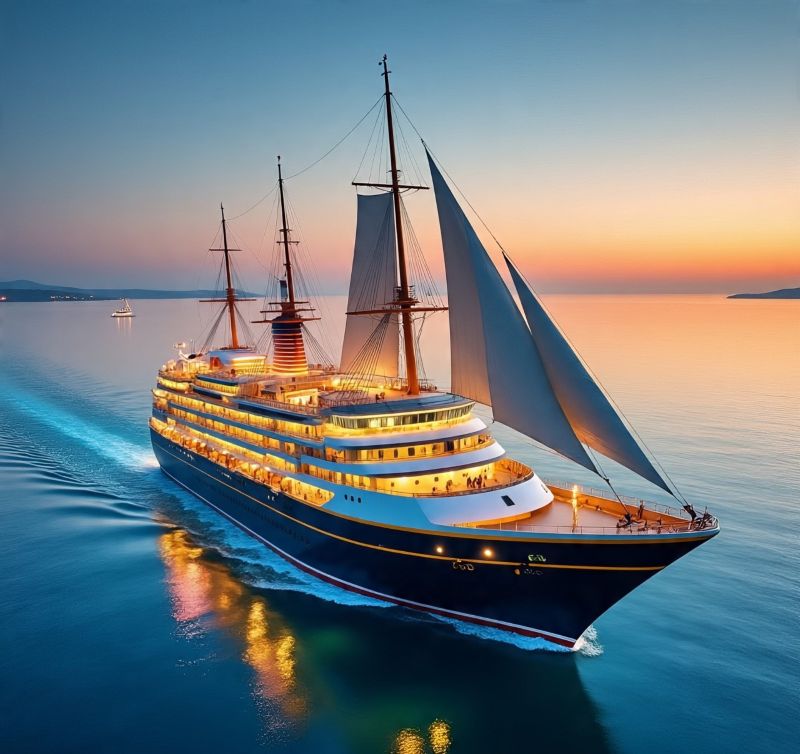≡-Will Scotland’s Cruise Tourism Surge Survive the Proposed Levy The Impact Could Be Bigger Than You Think What Does the Future Hold? – Viral of Today
<> Viral of Today <>
Home » CRUISE NEWS » Will Scotland’s Cruise Tourism Surge Survive the Proposed Levy The Impact Could Be Bigger Than You Think What Does the Future Hold? Published on
September 3, 2025Cruise tourism in Scotland has experienced rapid growth in recent years, becoming a major contributor to the nation’s economy. In 2023, this sector contributed a significant £343 million to Scotland’s financial framework, cementing its importance to local economies across the country. According to a comprehensive report from Oxford Economics, commissioned by the Cruise Lines International Association (CLIA), cruise tourism not only provided substantial economic benefits but also supported thousands of jobs and helped foster community development, particularly in rural and coastal areas. Despite its success, the industry faces challenges, notably the proposal of a cruise ship levy by the Scottish government, which could reshape the sector’s future in Scotland. This proposal has sparked concerns across the industry about potential negative economic impacts, especially on jobs, wages, and overall economic output.The Economic Contribution of Cruise Tourism in ScotlandIn 2023, Scotland’s cruise tourism sector proved itself to be a key player in driving economic growth, contributing a total of £343 million to the country’s overall economy. This robust figure underscores the crucial role that the cruise industry plays not only in Scotland’s urban centers but also in its more remote regions. A detailed report from Oxford Economics highlighted the sector’s substantial direct contribution of £173 million to Scotland’s GDP, signifying how much the industry strengthens other key sectors such as transportation, retail, hospitality, and local services.Moreover, the economic footprint of the cruise tourism sector extends beyond just direct financial contributions. The sector directly supports approximately 4,712 jobs, many of which are spread across a diverse range of industries, from hospitality to transportation, further strengthening the economy. Importantly, this sector’s impact is not confined to larger cities alone; it significantly benefits remote towns and villages that depend on seasonal tourism to fuel their economies. The £61 million in tax revenue generated by the cruise industry has been an important driver of public services and has helped fund vital infrastructure development projects, ensuring that communities, whether urban or rural, continue to thrive.The Proposed Cruise Ship Levy: Concerns and UncertaintyDespite these positive contributions, the proposed cruise ship levy, under consideration by the Scottish government, has cast a shadow over the future of the industry. The aim of this levy is to address growing concerns over environmental sustainability, but many stakeholders within the cruise industry fear that it could lead to unintended consequences for Scotland’s economy. A report issued by Cruise Scotland earlier in the year suggested that the implementation of such a levy could reduce cruise arrivals by as much as 20%. If this happens, Scotland could lose 672 jobs, experience a reduction of £20.7 million in wages, and see a drop in economic output by approximately £58 million.Industry leaders argue that the levy could disproportionately harm smaller communities, especially those that rely heavily on tourism from cruise ships. With cruise tourism becoming such an integral part of these areas’ economic fabric, any policy changes must be carefully considered to avoid undermining the sector’s positive economic impact.The Rapid Growth and Future Outlook of Cruise TourismCruise tourism in Scotland is on an upward trajectory, with projections indicating that by 2025, the number of cruise visits could exceed 1 million. This marks a continued increase in demand for Scotland’s scenic beauty and rich cultural heritage. The picturesque coastlines, stunning islands, and historic cities of Scotland are drawing more and more international travelers. As a result, the local economy stands to benefit even further from cruise tourism, with additional revenue and new employment opportunities on the horizon.Ports like Rosyth and Dundee have witnessed an uptick in passengers embarking on cruises directly from these locations, signaling a shift toward local departures. Another key development in Scotland’s cruise infrastructure is the £49 million deep-water terminal that will open in Stornoway in 2024. This new terminal will enhance Scotland’s appeal as a prominent stop for international cruise ships, positioning the country as a crucial player in the global cruise industry.The Positive Impact of Cruise Tourism on Remote CommunitiesOne of the lesser-discussed but highly significant effects of the cruise tourism sector is its ability to provide substantial economic benefits to remote coastal communities. These towns, which are often bypassed by mass tourism, have seen major boosts due to the arrival of cruise passengers. Predictable cruise schedules enable local businesses to prepare for increased foot traffic, helping them stay operational, especially during the off-peak seasons.Moreover, many cruise passengers are drawn to these smaller towns because they offer authentic, untouched experiences that large cities like Edinburgh and Glasgow cannot provide. The influx of tourists to these remote areas has allowed these communities to tap into the growing tourism economy in ways that were previously inaccessible to them. By diversifying the types of tourists visiting Scotland, the country has been able to ensure that even its smaller towns benefit from the positive economic effects of tourism.Sustainability and Balancing Growth with Environmental ProtectionAs the cruise tourism industry in Scotland continues to expand, there is increasing pressure to find a balance between growth and environmental sustainability. The Scottish government is fully aware of the environmental concerns associated with large cruise ships, particularly in relation to their carbon footprints and potential damage to natural ecosystems along Scotland’s coastlines. As a result, the government is actively exploring policies to address these issues without stalling the growth of the cruise tourism sector.One potential avenue to achieve this balance could involve providing incentives for cruise lines that adopt more eco-friendly practices, such as using cleaner fuels or adopting more sustainable ship technologies. Along with this, the government is working toward the responsible management of tourism across Scotland, focusing on policies that protect the environment while still allowing the tourism sector to flourish.To facilitate this, a dedicated working group has been set up to explore alternatives to the proposed cruise ship levy. This group is expected to present their findings to Scottish government ministers later this year, with the aim of crafting solutions that ensure both economic prosperity and environmental protection.Collaboration for Sustainable Growth in Cruise TourismThe future of Scotland’s cruise tourism sector will largely depend on the efforts of collaboration between the government, the cruise industry, and local communities. Although the cruise ship levy remains a point of contention, all parties share a common interest in ensuring that the benefits of the industry continue to flow into the economy while addressing environmental concerns.The government’s working group, tasked with finding alternative solutions to the levy, will likely push for incentives that encourage more environmentally responsible practices in the cruise sector. It is hoped that the resulting policy will provide a path forward that not only benefits the local economy but also helps preserve the natural landscapes that make Scotland such an attractive destination.The Road Ahead: Looking to the Future of Scotland’s Cruise IndustryIn conclusion, the cruise tourism sector has become a crucial part of Scotland’s economy, contributing billions to the national financial system and providing thousands of jobs. While the proposal of a cruise ship levy represents a potential obstacle, it also presents an opportunity to reassess and design a framework for sustainable growth within the sector. As Scotland’s cruise tourism industry expands, it is critical that policies are introduced to safeguard both economic benefits and environmental integrity.By finding a way to balance sustainable growth with economic development, Scotland can maintain its status as a top-tier destination for cruise travelers. As the debate surrounding the levy continues, it is clear that Scotland’s natural beauty, expanding infrastructure, and increasing global appeal will make it an increasingly popular stop on global cruise itineraries. The key to ensuring its future success will lie in developing policies that not only promote responsible tourism but also ensure the continued prosperity of the industry.Key Takeaways for the Travel IndustryThe growth of cruise tourism in Scotland has injected millions into the national economy, particularly benefiting rural and remote communities.Proposals for a cruise ship levy have raised concerns about possible job losses, reduced wages, and negative economic impacts, particularly in smaller towns.The increasing demand for Scotland’s natural and cultural assets is likely to continue, driving further economic growth in the cruise sector.Sustainable growth in cruise tourism will require collaboration between government, industry stakeholders, and local communities to balance economic growth with environmental protection.As the future of Scotland’s cruise tourism sector unfolds, it will have significant implications not only for the local economy but also for the broader global travel landscape. It remains to be seen how policies will evolve, but the need for a balanced approach is paramount in ensuring the long-term success and sustainability of the cruise tourism industry in Scotland.
This information will surprise you!
See also
- Read until the end to discover everything.
- Important information you need to know.
- Interesting facts and helpful tips.
Conclusion
Did you enjoy the news? Keep following us daily!













